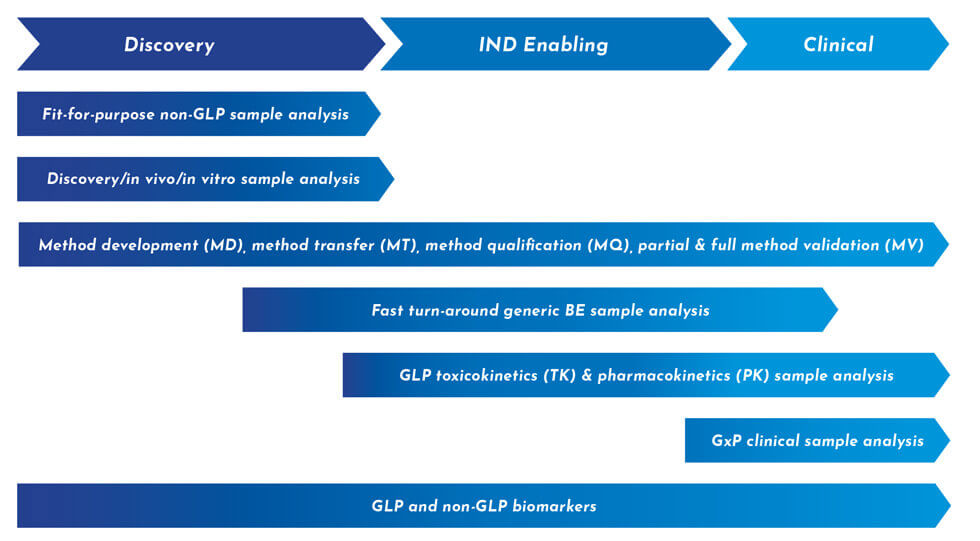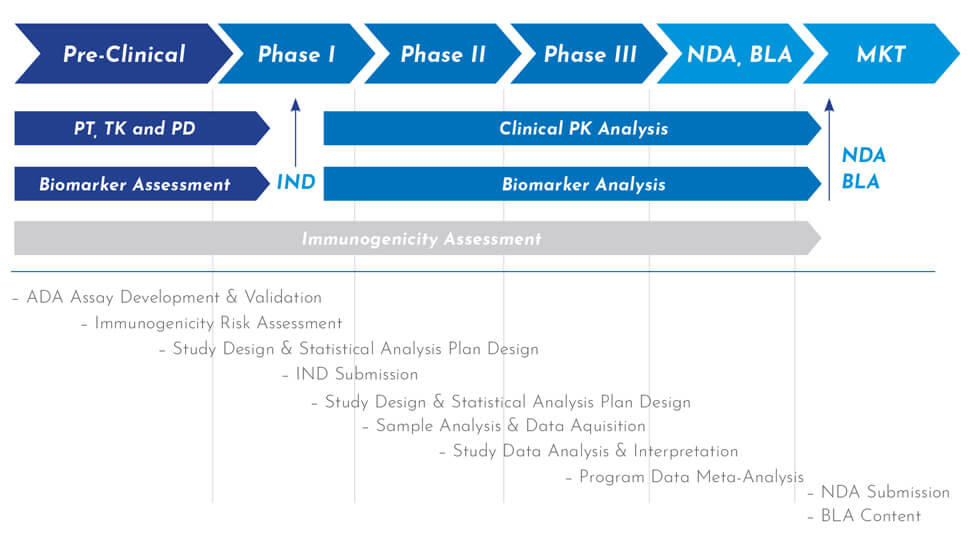Preclinical Bioanalysis
Speak to an Expert
about how we can help with your upcoming project
Seamlessly Moving Your Program from Discovery to Regulated Preclinical Bioanalysis
As your drug development partner, our scientists provide you with the regulated preclinical bioanalytical support your compound needs for IND submission. Using the insights from our discovery efforts, we significantly reduce timelines by eliminating the need to transfer a compound from one unit to another. Our preclinical bioanalytical services support toxicology activities for small- and large-molecule drugs with global Good Laboratory Practice (GLP) regulatory compliance.

LC-MS/MS Quantitation of Peptides and Proteins
Rapid Method Development
- Peptides 2-4 weeks
- Proteins 4-6 weeks
Extensive Experience
- Non-specific binding
- Sensitivity tune-up
- Trypsin digestion conditions
- Microelution solid phase extraction (SPE) optimization
Diversified Peptides and Proteins
- Different species and matrices
- Molecule weight of surrogate peptide ~7000 Da
Fast Synthesis Capabilities
- 2 weeks turnaround time
- Synthesize surrogate peptide
- Synthesize SIL-IS
Immunochemistry Platform
Using state-of-the-art equipment and advanced automation systems, our immunochemistry platform supports the development of large molecule products, including biologics, biomarkers and vaccines. Operating out of 20,000 square feet of GLP laboratory space, our Bioanalytical Services team has the capacity to handle over 60,000 samples per month, and has validated over 100 biomarker assays to support your large molecule programs.

Track Record of Experience
Immunogenicity Assessment Journey
Biotherapeutics present many challenges in drug development. One is that they are more likely to trigger the immune system when compared to small molecule drugs, which can lead to unwanted effects. Regulatory agencies require extensive immunogenicity testing, and neglecting this vital element of your Investigational New Drug (IND) package can lead to clinical delays. WuXi AppTec collaborates with you to develop custom reagents and assays that analyze key measures of the immune response, along with expert support in executing the multi-tiered testing that adheres to U.S. Food and Drug Administration (FDA) immunogenicity guidelines.

Custom Bioreagent Development
We develop custom reagents to support your candidate in the assessment of immunogenicity, PK and PD bioanalytical services. Once validated, they can rapidly analyze therapeutic candidates, to advance development efforts.
We can generate customized antibodies and proteins including:
- Monoclonal
- Polyclonal
- Recombinant proteins
- Peptides
Preclinical Bioanalysis FAQs
What is preclinical bioanalysis?
Quantitatively measuring drugs, metabolites and biomarkers in biological samples during the preclinical stage of drug development is crucial for assessing the safety and effectiveness of potential drug candidates in animal models.
Why is preclinical bioanalysis important?
Bioanalysis conducted during the preclinical phase yields vital information about drug candidates’ pharmacokinetics, pharmacodynamics and toxicokinetics. This data is instrumental in comprehending drug candidates’ behavior in the body, influencing dosage determinations and safety assessments prior to clinical trials.
What types of samples are analyzed in preclinical bioanalysis?
Typical samples in preclinical bioanalysis comprise blood, plasma, serum, urine, tissue, and other biological fluids, which are examined to measure the levels of drugs, metabolites, and biomarkers.
What analytical techniques are used in preclinical bioanalysis?
Frequently used methods in preclinical bioanalysis encompass liquid chromatography-mass spectrometry (LC-MS), gas chromatography-mass spectrometry (GC-MS), and enzyme-linked immunosorbent assays (ELISA). These techniques provide exceptional sensitivity and specificity detecting and quantifying analytes.
How are bioanalytical methods validated?
Bioanalytical methods undergo validation in accordance with regulatory guidelines to guarantee accuracy, precision, sensitivity, specificity, reproducibility and robustness. Validation is essential to ensure the reliability and consistency of the methods’ results.
What regulatory guidelines govern preclinical bioanalysis?
Bioanalytical processes during the preclinical phase must adhere to regulatory guidelines set forth by international regulatory bodies. These guidelines establish the criteria for method validation, sample analysis and data reporting.
Can customized bioanalytical services be provided for specific projects?
Yes, tailored bioanalytical services can be customized to fulfill the specific requirements of various projects. This encompasses developing and validating unique analytical methods to address particular research inquiries.
How long does it typically take to complete a preclinical bioanalysis study?
The duration of a preclinical bioanalysis study is determined by the project’s complexity, sample quantity and the analytical methods needed. Timelines are typically established and confirmed during the project planning phase.
What is the focus of WuXi AppTec's preclinical bioanalysis services?
WuXi AppTec specializes in providing regulated preclinical bioanalytical support for small and large molecule drugs, focusing on the needs of IND submissions.
What technologies does WuXi AppTec use for preclinical bioanalysis?
Our facilities employ LC-MS/MS for peptide and protein quantitation and immunochemistry platforms for large molecule products, including biologics, biomarkers, and vaccines.
How does WuXi AppTec support immunogenicity testing?
WuXi AppTec offers comprehensive immunogenicity assessments adhering to all major regulatory agency guidelines, including developing custom reagents and assays.
What custom bioreagent development services does WuXi AppTec offer?
WuXi AppTec develops custom bioreagents such as monoclonal and polyclonal antibodies, recombinant proteins, and peptides to support bioanalytical assessments.